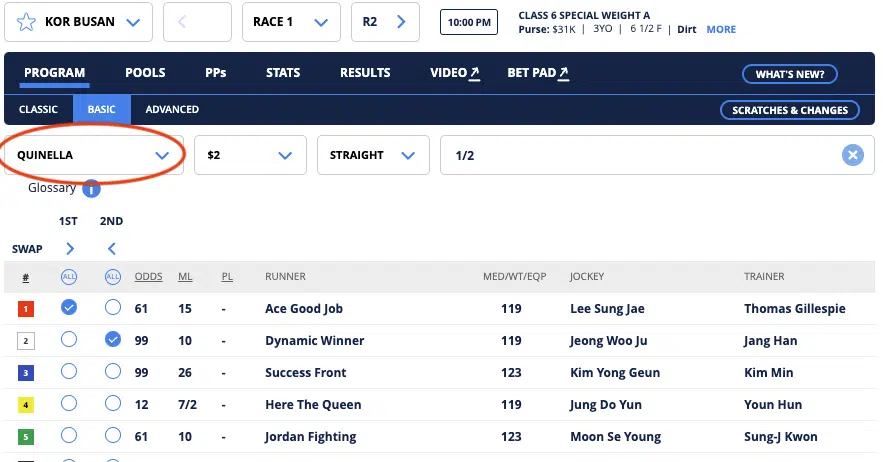The quinella bet is a simple wager in which the bettor selects two horses to finish an upcoming race in first and second place. The order of finish does not matter. As long as the selected horses finish in first and second place, in any order, the bet wins.
When new horse racing bettors are ready to graduate from the basic straight bets (win, place, and show) to exotic wagers, the quinella is a good place to begin. It is one of horse racing’s simplest exotic bets and serves as a starting point for moving into wagers that involve more than one horse.
 $200 Deposit BonusTwinSpires Offer Code: BET200
Void where prohibited. Terms and conditions apply. Offer for TwinSpires Racing only. See TwinSpires.com for details. Must be 18+ (21+ where applicable). For help with a gambling problem, call 1-800-GAMBLER.
$200 Deposit BonusTwinSpires Offer Code: BET200
Void where prohibited. Terms and conditions apply. Offer for TwinSpires Racing only. See TwinSpires.com for details. Must be 18+ (21+ where applicable). For help with a gambling problem, call 1-800-GAMBLER.
 $150 Deposit BonusAmWager Promo Code: BUSA150
Promotional offer valid and continues until further notice.
Open to new AmWager account holders who have not previously opened an AmWager account. Individuals may only have one (1) AmWager account and may only qualify for a signup promotion one (1) time.
The First Deposit Match Bonus promotion applies to the first deposit made; any subsequent deposits will not apply.
The amount of the first deposit will determine the amount of the bonus and bets that must be placed to earn the bonus. For example, to qualify for the maximum bonus of $150 an initial deposit of $150 is required and total bets must equal $150 or more within 30 days of sign up. Cancelled wagers and refunded wagers are not eligible and will not be counted towards the promotion.
The total promotional wagering credits will be credited to the AmWager account in a single deposit within seven (7) business days of meeting the betting requirements for this promotion. Any promotional wagering credits deposited to a player’s account must be wagered and cannot be withdrawn from the account. Any winnings from those wagers are cash and can be withdrawn.
Any portion of the promotional credits unused expires after 30 days.
Account must remain in good standing to be eligible for all promotions. Returned deposits during the promotional period will cancel eligibility to receive promotional wagering credit.
Limit one promotional offer per household.
$150 Deposit BonusAmWager Promo Code: BUSA150
Promotional offer valid and continues until further notice.
Open to new AmWager account holders who have not previously opened an AmWager account. Individuals may only have one (1) AmWager account and may only qualify for a signup promotion one (1) time.
The First Deposit Match Bonus promotion applies to the first deposit made; any subsequent deposits will not apply.
The amount of the first deposit will determine the amount of the bonus and bets that must be placed to earn the bonus. For example, to qualify for the maximum bonus of $150 an initial deposit of $150 is required and total bets must equal $150 or more within 30 days of sign up. Cancelled wagers and refunded wagers are not eligible and will not be counted towards the promotion.
The total promotional wagering credits will be credited to the AmWager account in a single deposit within seven (7) business days of meeting the betting requirements for this promotion. Any promotional wagering credits deposited to a player’s account must be wagered and cannot be withdrawn from the account. Any winnings from those wagers are cash and can be withdrawn.
Any portion of the promotional credits unused expires after 30 days.
Account must remain in good standing to be eligible for all promotions. Returned deposits during the promotional period will cancel eligibility to receive promotional wagering credit.
Limit one promotional offer per household.
 $200 Deposit BonusDRFBets Promo Code: STAKES
Must be 18 or older (21 in AL, AZ, IA, IN, KS, NH, ND, WA) to open an account with DRF Bets and reside in a state where such activity is legal. Void where prohibited. Always Wager Responsibly. If you think you might have a problem, please contact the National Gambling Helpline (800) 522-4700. T&Cs Apply.
$200 Deposit BonusDRFBets Promo Code: STAKES
Must be 18 or older (21 in AL, AZ, IA, IN, KS, NH, ND, WA) to open an account with DRF Bets and reside in a state where such activity is legal. Void where prohibited. Always Wager Responsibly. If you think you might have a problem, please contact the National Gambling Helpline (800) 522-4700. T&Cs Apply.
21+ to Play, T&Cs Apply. Gambling Problem? Call 1-800-GAMBLER
Quinella Bet Example
For an example of a quinella bet in action, imagine a race with seven runners. Your research tells you horses #2 and #6 are significantly better than the competition, but you can’t quite tell which of the two is the strongest. In this case, you could place a quinella on horses #2 and #6 to cover two possible outcomes:
- Horse #2 finishes first and Horse #6 finishes second
- Horse #6 finishes first and Horse #2 finishes second
As long as Horses #2 and #6 occupy the race’s top two finishing places, your quinella wins.
Quinella Vs. Exacta
The quinella and exacta bet are related, but they are not the same. Both involve selecting two horses to finish in first and second place, but the exacta requires the selections to finish in the exact order specified by the bettor. A quinella provides more leeway by providing a win as long as both horses finish in first and second place regardless of the order.
Bettors can place a two-horse exacta box to accomplish the same thing as a quinella, but traditionally, the minimum base wager for both bets is $2. Thus, a bettor would spend $4 on a two-horse exacta box when they could have placed a single quinella for half the cost.
However, many race tracks today allow bettors to place $1 exactas. A $1 exacta box with two horses costs the same as a $2 quinella. In that case, there is no functional difference between the two bets. Both bets pay if the selected horses finish in first and second place in any order, and both bets cost $2.
In situations where the quinella and exacta box have the same total cost, bettors can look at the betting pools and probable payouts to decide which wager may offer the higher return.
Something else to keep in mind is if the bettor favors one horse more than the other, exactas offer more flexibility in how much bettors weight their wagers toward one horse or the other.
Consider a bettor who has $20 to spend, likes Horses #6 and #7, but likes Horse #7 the best. That bettor could place a $20 quinella on Horses #6 and #7 to give them equal weighting, but a better option in that situation might be to place a $15 exacta going one way (7-6) and a $5 exacta going the other (6-7).
How to Place a Quinella Bet Online
Quinella bets are hard to find but easy to place. Very few racetracks offer quinellas today, and bettors who primarily bet on US races are unlikely to ever see quinellas on offer.
However, bettors can approximate quinellas by reducing the intended wager by half and boxing an exacta. An exacta box bet placed at half the price will end up costing the same as a quinella and pay regardless of the two horses’ finishing orders.
When betting on tracks that support horse racing quinella bets, placing the wager is simple. Below is a screenshot from a South Korean race that offered quinellas:

All I had to do to place this wager was use the dropdown selector (circled in red) and pick quinella from the list. After that, I selected a wager size of $2, left it as a straight quinella (as opposed to boxing or wheeling it), and chose two horses: Ace Good Job and Dynamic Winner.
The order of finish doesn’t matter in a quinella, so bettors can ignore the “1st” and “2nd” notations heading the two selection columns.
Quinella Box Bet
A quinella box bet allows bettors to add additional horses to the ticket and cover every possible winning combination. As more horses are added to the box, the price of the bet also increases to account for the additional winning combinations.
For example, a $2 quinella box bet (2-3-4) would cost $6 and cover the following outcomes for first and second place finishes (in any order):
- Horses #2 and #3
- Horses #3 and #4
- Horses #2 and #4
Essentially, quinella box bets are just multiple quinellas put onto a single ticket. The above example consists of a $2 quinella on Horses #2 and #3, a $2 quinella on horses #3 and #4, and a $2 quinella on horses #2 and #4 for a total cost of $6.
An easy way to determine the total cost of a quinella is the multiply the number of horses in the box times itself minus one. For example, a 3-horse box would cost 3×2 or $6. A 4-horse box would cost 4×3 or $12, and so on.
- 3-horse quinella box: $6
- 4-horse quinella box: $12
- 5-horse quinella box: $20
- 6-horse quinella box: $30
- 7-horse quinella box: $42
Quinella Wheel Horse Bets
A quinella wheel bet functions similarly to the quinella box, but it focuses on one key horse to appear in all combinations with other selections.
For example, imagine the bettor is confident that Horse #4 will finish a race in first or second place. Now imagine the bettor also likes horses #6, #7, and #8 but doesn’t have as strong an opinion on any of those three. All three are solid horses, but none of them stand out as strongly as Horse #4.
This would be a good time to place a quinella wheel horse racing bet with #4 as the first key and #6, #7, and #8 as the second key. In this instance, the bettor could place a $2 quinella wheel on 2 with 6, 7, and 8.
This bet would cost $6 and win if Horse #4 finishes in first or second place alongside any of the other three selections. To put that another way, the bet wins if the race ends with any of the following outcomes for first and second place:
- 4-6 or 6-4
- 4-7 or 7-4
- 4-8 or 8-4
Another way to think of it is the bettor has placed three $2 quinellas on horses 4-6, 4-7, and 4-8. The mechanics of Quinella bets are similar to the quinella box, but the bettor pays less by keying the #4 horse. A quinella box involving four horses would have cost $12, but this one costs half as much due to having fewer winning combinations.
To be accurate regarding naming conventions, the example described so far is termed a “quinella part-wheel” because it involves a key horse and only some of the other runners.
A full quinella wheel works the same but keys one horse with every other runner in the field. A quinella full wheel therefore wins on every outcome in which the keyed horse finishes in first or second place.

